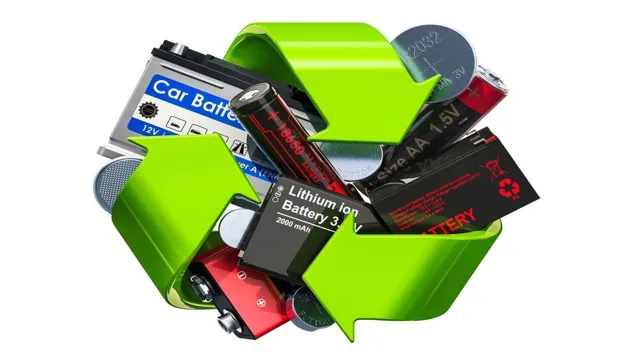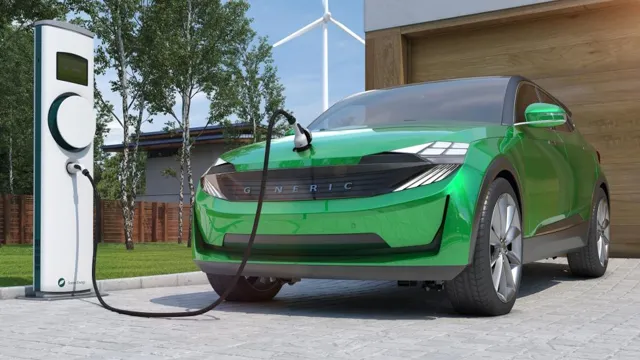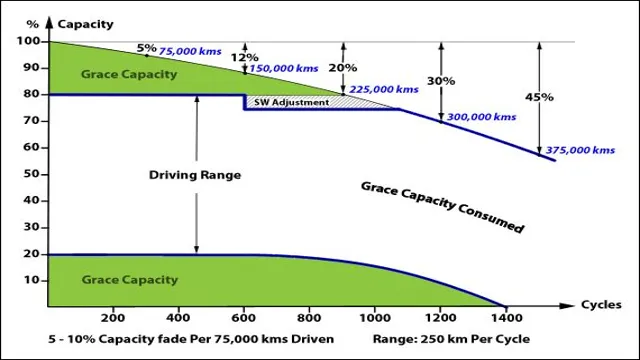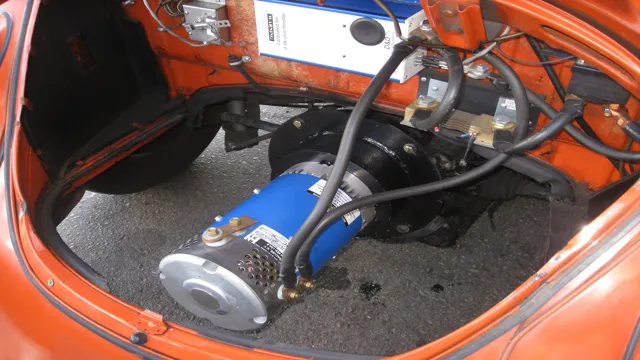Revving up Sustainability: Learn How Electric Car Batteries Can Be Recycled!
Are you curious about the fate of electric car batteries once their life on the road is done? As more and more individuals switch to eco-friendly electric vehicles, there is a growing concern about the impact of battery waste on the environment. Fortunately, recycling electric car batteries has become an innovative and efficient solution to this looming issue. In this blog post, we will explore the recycling process of electric car batteries, as well as the benefits it holds for both the environment and the economy.
So buckle up and let’s dive into the world of recycling electric car batteries!
Overview of Electric Car Batteries
When it comes to electric car batteries, one question that often comes up is whether or not they can be recycled. The good news is that yes, they can! In fact, the vast majority of electric car batteries are designed with recyclability in mind. This is because the materials used to make these batteries, such as lithium and cobalt, are finite resources that can be expensive and environmentally damaging to mine.
By recycling these batteries, manufacturers can recover valuable materials and reduce the environmental impact of producing new batteries. Additionally, recycling can also help to reduce waste and create jobs in the recycling industry. So if you’re concerned about the impact your electric car battery may have on the environment, rest assured that it can be recycled and put to good use.
Composition of Batteries
Electric car batteries are complex and are made up of many different components. The most crucial component of any battery is the cells that hold the charge. These cells are made up of an anode and cathode, which are separated by an electrolyte.
The anode is typically made of carbon, while the cathode is made of a transition metal oxide material. When the battery is charged, electrons flow from the cathode to the anode through an external circuit, making the battery store energy. Lithium-ion batteries are the most common type of electric car batteries, and they have become the mainstay of the electric vehicle industry due to their high energy density and rechargeable properties.
Their small size and lightweight design make them ideal for use in electric vehicles, making it possible for electric cars to travel for much longer distances than previously possible. As with all technology, electric car batteries are constantly evolving, and new materials and designs are being developed to create more efficient and eco-friendly batteries.
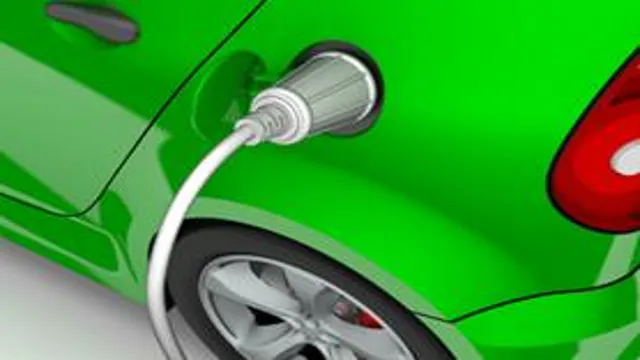
Environmental Impact of Batteries
Electric car batteries have been praised for their environmental benefits when compared to traditional gasoline-powered vehicles. However, it’s important to note that these batteries come with their own environmental impact. Electric car batteries are typically made from materials like lithium, cobalt, and nickel, which require mining.
This mining process can lead to soil and water pollution, and it also requires a lot of energy. Additionally, the manufacturing of these batteries requires a significant amount of energy, which leads to carbon emissions. Furthermore, when these batteries reach the end of their life, they can become e-waste, which is harmful to the environment if not disposed of properly.
Overall, it’s important to consider the full lifecycle of electric car batteries and work towards finding more sustainable solutions.
Recycling Process
Can electric car batteries be recycled? Absolutely! In fact, recycling electric car batteries is an essential part of the electric vehicle industry’s sustainability efforts. The recycling process involves disassembling the battery pack, sorting the components, and recycling each material individually. The lithium-ion batteries commonly used in electric cars contain valuable metals like cobalt, nickel, and lithium that can be reused in battery production or other industries.
Plus, recycling helps prevent the release of harmful toxins into the environment that can occur if batteries are not properly disposed of. While the recycling process is not yet perfect, efforts are underway to improve the efficiency and sustainability of the process. So, next time you’re considering an electric car, know that its battery can be recycled and put to good use even after its useful life in your vehicle is over.
Collection & Sorting
Recycling Process – Collection & Sorting The first step in the recycling process is collection and sorting. This involves separating different types of waste, such as plastics, glass, paper, and metal, from each other. There are a variety of ways that this can be done.
Some communities have curbside recycling programs where residents can place recyclable materials in a designated bin that is picked up by a waste management company. Other communities may have recycling centers where residents can drop off their recyclables. Regardless of the method used, it is important that materials are sorted properly to ensure that they can be recycled efficiently.
This involves removing any contaminants from materials, such as food residue from plastic containers or labels from glass bottles. Once the materials have been sorted and cleaned, they are sent to a processing plant where they are transformed into new products. By participating in the collection and sorting process, individuals can play a key role in reducing waste and preserving the environment.
Mechanical & Chemical Steps
The recycling process consists of a series of mechanical and chemical steps to break down waste materials and transform them into new products. Mechanical recycling involves shredding and melting plastics, metals, and other materials to produce pellets that can be used in the creation of new products. In this process, contaminants are removed, and the material is sorted according to type.
Chemical recycling, on the other hand, uses a process that breaks down plastics into their smaller chemical components. This method helps to recover materials that are difficult to recycle, such as mixed plastics. Some of these materials can be broken down into their core components and used to create new materials or fuels.
One of the key benefits of recycling is that it helps to reduce waste in landfills, which can take hundreds of years to decompose. Lower levels of waste can also help the environment by reducing pollution and greenhouse gas emissions. By implementing a more sustainable approach to waste management, we can reduce our reliance on natural resources and help to protect the environment for future generations.
Recycling plants, governments, and individuals all play a crucial role in keeping the process going. Sorting waste items at the source and ensuring that they are clean and dry can help to streamline the recycling process and increase the efficiency of recovery. Participating in local recycling programs and choosing products made from recycled materials can also help to support a more sustainable future.
Ultimately, the recycling process serves as a means of conserving resources and reducing waste while also providing potential economic benefits.
Recovery of Materials
Recycling materials is an essential process in our world as it helps to reduce the amount of waste that ends up in landfills. The recycling process is a great way to recover materials from waste and turn them into new products that can be used again. The process begins with separating the recyclables from the waste, which can be done manually or using a machine.
After separation, the materials are then cleaned, sorted, and processed into raw materials that can be used to make new products. For example, plastic bottles can be washed, shredded, melted, and then formed into new products such as pens, chairs, or even clothing. The metal collected from electronic devices can be smelted down and then used for new products.
The recycling process reduces the need to extract virgin materials, conserves natural resources, reduces air and water pollution, and saves energy. Recycling is an important step in preserving our environment for future generations. So, next time, when you have something that can be recycled, make sure to put it in the recycling bin and help our environment.
Benefits of Battery Recycling
Can the electric car batteries be recycled? Yes, they can! Battery recycling provides many benefits to the environment and society. Firstly, recycling prevents batteries from ending up in landfills, where they can potentially leak hazardous chemicals and damage the environment. Secondly, recycled materials from batteries reduce the need for newly mined materials, which can help in reducing deforestation, preserving ecosystem diversity and reducing water pollution.
Thirdly, battery recycling helps create jobs in the recycling industry while boosting local economies. Additionally, recycling batteries helps to lower the production cost of batteries, making EVs more affordable for consumers while contributing to the reduction of carbon emissions. In conclusion, battery recycling is an eco-friendly process that can address some of the environmental concerns associated with EVs, promote sustainable development, and gear towards achieving a circular economy.
Conservation of Natural Resources
Battery recycling has become an essential practice in today’s world. The benefits of recycling batteries are not only limited to the environment but also prevent further depletion of natural resources. Recycling batteries helps reduce the amount of waste that goes to landfills, which can take hundreds of years to decompose.
When batteries are properly recycled, valuable metals such as cadmium, lead, and mercury can be extracted and used again. This process saves natural resources, which would have otherwise been used to create new batteries. It also reduces the amount of energy required for the manufacturing process, saving more natural resources.
In addition, recycling batteries can prevent these toxic metals from polluting the environment and harming wildlife. Recycling batteries is a simple but powerful way to conserve our natural resources and protect the environment. So, let’s make battery recycling a habit and contribute to the sustainable development of our planet.
Reduced Environmental Impact
Battery recycling offers a wide range of benefits to the environment. By recycling old and used batteries, we not only reduce their environmental impact but also conserve natural resources. The process of recycling batteries reduces the need for mining, which is energy-intensive and has many negative environmental impacts.
Recycling batteries also helps in the effective management of hazardous waste and reduces the amount of waste that ends up in landfills. The materials recovered from recycling batteries can be reused to manufacture new batteries, reducing the need for raw materials and reducing energy consumption. This means that recycling batteries plays an essential role in creating a sustainable future.
By choosing to recycle our old batteries instead of throwing them away, we can help reduce our carbon footprint and ensure a cleaner and healthier planet for generations to come.
Conclusion
In conclusion, while the idea of recycling electric car batteries may seem daunting, it is indeed possible. The technology and infrastructure required to make it feasible are steadily improving, and with continued investment and innovation, our futures may be filled with sustainable transportation options that leave minimal impact on the environment. So the next time someone asks if electric car batteries can be recycled, the answer is a resounding “yes, we’re working on it!” And in the immortal words of Henry Ford, “Coming together is a beginning, staying together is progress, and working together is success.
“
FAQs
Why is recycling electric car batteries important?
Recycling electric car batteries is important because it helps to reduce the amount of waste in landfills and prevents harmful chemicals from leaching into the soil and water.
What materials are found in electric car batteries?
Electric car batteries are made up of a combination of metals, including lithium, cobalt, nickel, and manganese.
Can electric car batteries be fully recycled?
While electric car batteries can be recycled, the process is not yet perfect and some materials may be lost during the recycling process.
How are electric car batteries recycled?
Electric car batteries are typically shredded, and then a series of chemical and physical processes are used to extract the valuable metals from the battery cells. These metals are then used to create new batteries or other products.
